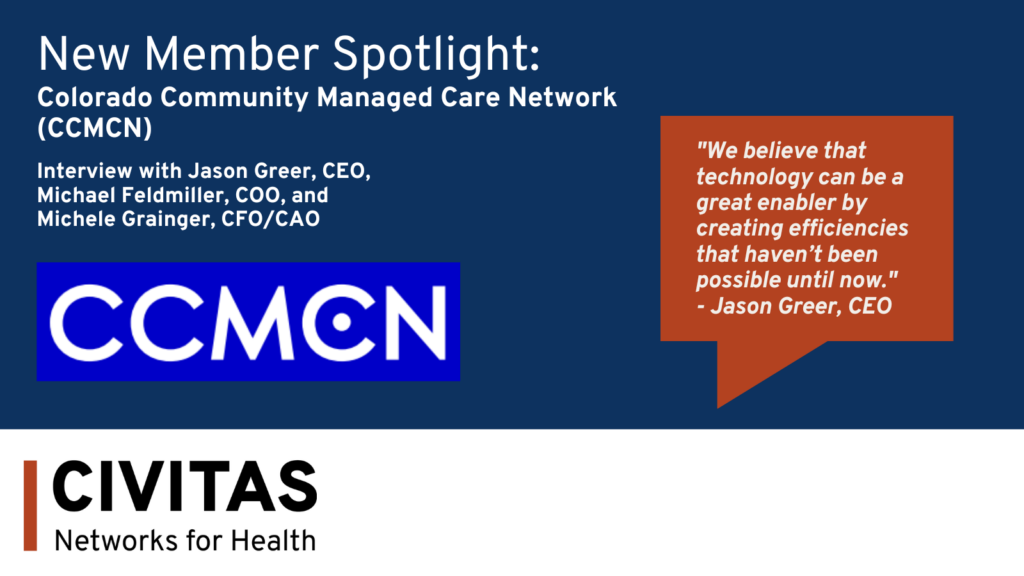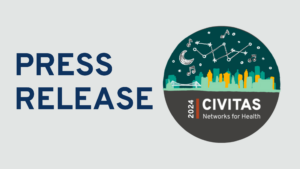We recently caught up with leaders from Colorado Community Managed Care Network (CCMCN) to discuss their efforts to improve interoperability and health care technology within the state of Colorado and to learn about their interest in being a part of the Civitas national network.
Meet Jason Greer, CEO, Michael Feldmiller, COO, and Michele Grainger, CFO/CAO
Written by
Malik Chambers, Communications Specialist, Civitas Networks for Health

What is CCMCN’s value proposition to your stakeholders?

Jason Greer: As a federal and state-funded non-profit health information organization that is governed by Colorado’s Federally Qualified Health Centers, our passion is to help create a positive impact on reducing health equity issues by applying innovative technology, data, and payment systems to community collaborations. Our value proposition is that we identify the best-in-class technology systems available, we integrate them into our technology stack, and we provide them to community organizations across Colorado so that they can target specific interventions that address reducing disparities and improving equity in every community. We integrate demographic, clinical, HIE, claims, SDOH, and public health data to provide community-level analytics and proactive community care coordination support. Our “Honeycomb” Community Data Network allows organizations to maintain control of their sensitive data while enabling them to turn on and off data sharing with multiple parties as needed. We also calculate incentive models and provide payment to healthcare and community organizations to support their ability to participate in community collaborations that systematically address local issues, such as reducing recidivism, improving maternal and child outcomes and improving a person’s experience when navigating the complexity of community services.
Are there any issues and barriers to health care access that are unique to Colorado?
Michael: That is a good question. Many of the Rural Health Providers we work closely with are experiencing sustainability issues, while needing to improve their Electronic Health Records Systems (EHR) and population health technology. We have seen a lot of news about Rural Health Centers and Critical Access Hospitals being at risk of closing their doors in the future. In response, the State is investing resources to improve EHR Systems, Population Health Analytics, and other technology solutions that rural providers can adopt to improve care.
Jason: In my experience, most of the barriers in Colorado exist in other states too. The state of Colorado and CCMCN are highly focused on addressing health equity issues. As Michael mentioned, there is a digital divide between rural and urban communities. The center of Colorado is densely populated, and the population significantly thins out around the perimeter. I think the barrier to health care access can be attributed to the lack of available health care providers in those regions and unreliable and sometimes non-existent broadband access in our rural and frontier communities.
How important is it to bring your stakeholders up to speed on the latest health care technology?

Jason: We believe that technology can be a great enabler by creating efficiencies that haven’t been possible until now. We want to make sure that our communities have access to sophisticated technology to support their internal operations while we also ensure that there are sophisticated technology systems running between organizations, breaking down the existing silos of care. CCMCN’s innovative Honeycomb Community Data Network is designed to resolve this issue by becoming the interoperability fabric across every Colorado community.
What are some things that excite you about being a part of a national network like Civitas?
Michael: I’m really excited about joining Civitas. It was great to see the health equity focus during the Civitas Annual Conference in 2022. Our organization is finding more opportunities to conduct health equity analysis, and we are excited to work with other organizations to collaborate on addressing disparities in health care.
Michele Grainger: I agree with Michael. I’m excited to see what other organizations and states are doing. It also looks like Civitas has extensive resources to access, so I am excited about that!
Jason: As a health information organization focused on supporting vulnerable populations, we want to learn as much as we can about what our peers are doing in other states. The exchange of best practices is very helpful to identify what works so that we can be more effective faster. It’s clear that many health information organizations are trailblazing at the same time into uncharted territory, and it’s important for CCMCN to be a part of a national association that understands the business models and strategies that we are working on. The information we can learn together in the Civitas network is a big component of the Civitas value proposition.
You touched on CCMCN’s focus on health equity, improving technology, and interoperability. As you look ahead, what are some opportunities that you are tackling as you aim to improve your services going forward?

Michael: The State of Colorado has many exciting opportunities ahead, including advanced efforts to increase interoperability between data systems, behavioral health integration, and improving the integration of healthcare and non-healthcare service organizations around the needs of the people they serve.
Jason: One way that we support health equity is by starting every project with the intended outcome. While we have a large stack of interoperable technology systems, we start community conversations by identifying the outcomes and improvements that each community needs to address. We always have the outcome in mind when implementing community systems because that tells us who needs to be involved, what technology and data are needed, what legal agreements are required, what funding is needed and what needs to be measured to demonstrate that we’re helping the community make a positive impact. We’re always watching performance measures to identify when changes are happening and adjust our approach as needed.
Final thoughts?
Jason: I would like to add a shameless plug for the Health Center Controlled Networks (HCCNs) in every state. HCCNs are Health Resources and Services Administration (HRSA) funded networks and we support the Federally Qualified Health Centers nationally. We are developing a National Data Strategy to connect all of the HCCNs together to focus on improving outcomes on a national scale. This work is being done in coordination with HRSA and the National Association of Community Health Centers (NACHC). We would love to work with any organization that shares our passion for equity and reducing disparities across Colorado and nationally.


